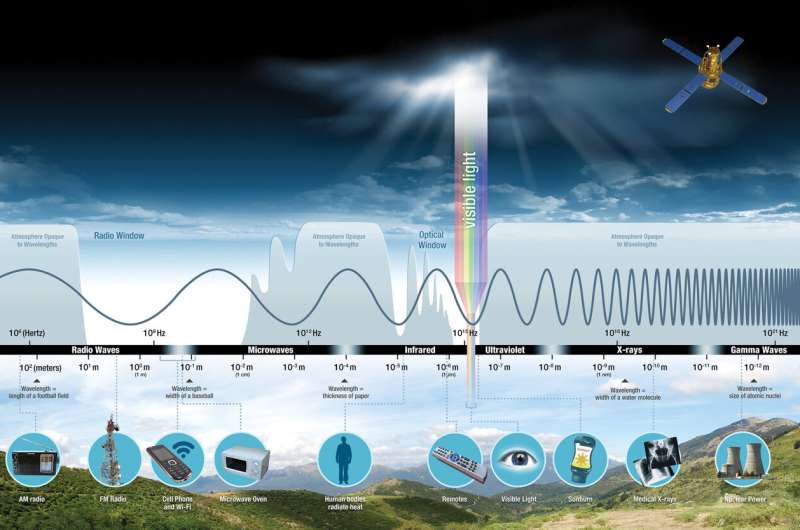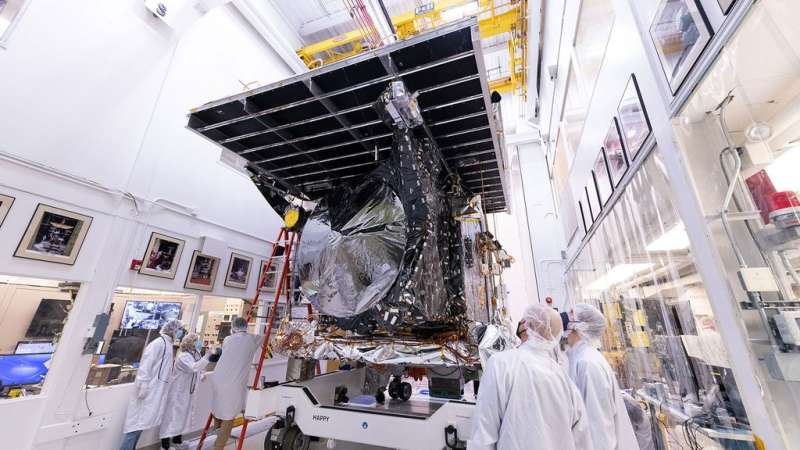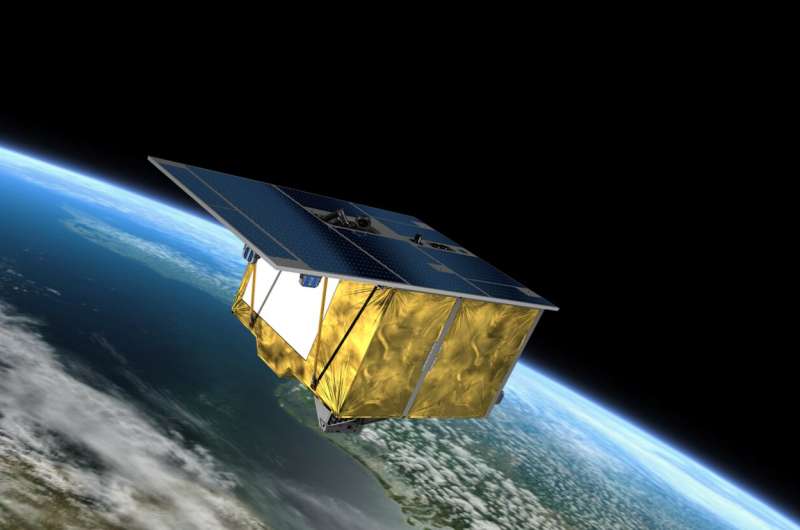
Copernical Team
SwRI's Space System Integration Facility supports smallsat development
 Southwest Research Institute has added a new, 74,000-square-foot Space System Integration Facility to its San Antonio headquarters. The SwRI facility can rapidly respond to customers needing to design, assemble and test spacecraft, particularly small satellites for emerging "new space" applications, including support for the commercial and U.S. Department of Defense arenas. The building is sched
Southwest Research Institute has added a new, 74,000-square-foot Space System Integration Facility to its San Antonio headquarters. The SwRI facility can rapidly respond to customers needing to design, assemble and test spacecraft, particularly small satellites for emerging "new space" applications, including support for the commercial and U.S. Department of Defense arenas. The building is sched Kleos launches Patrol Mission satellites
 Kleos Space S.A, (ASX: KSS, Frankfurt: KS1) a space-powered Radio Frequency Reconnaissance data-as-a-service (DaaS) company, successfully launched its third satellite cluster, the Patrol Mission on 01 April 2022 onboard the Transporter-4 SpaceX mission.
The D-Orbit Orbital Transfer Vehicle carrying the four Patrol Mission satellites has been successfully deployed into a 500km Sun Synchrono
Kleos Space S.A, (ASX: KSS, Frankfurt: KS1) a space-powered Radio Frequency Reconnaissance data-as-a-service (DaaS) company, successfully launched its third satellite cluster, the Patrol Mission on 01 April 2022 onboard the Transporter-4 SpaceX mission.
The D-Orbit Orbital Transfer Vehicle carrying the four Patrol Mission satellites has been successfully deployed into a 500km Sun Synchrono Early Universe bristled with starburst galaxies
 In the first few billion years after the Big Bang, the universe contained far more so-called starburst galaxies than models predict. As many as 60 to 90 percent of the stars in the early universe appear to have been produced by galaxies undergoing a growth spurt. This is what an analysis of more than 20,000 distant galaxies show. The team, led by astronomers from University of Groningen (the Net
In the first few billion years after the Big Bang, the universe contained far more so-called starburst galaxies than models predict. As many as 60 to 90 percent of the stars in the early universe appear to have been produced by galaxies undergoing a growth spurt. This is what an analysis of more than 20,000 distant galaxies show. The team, led by astronomers from University of Groningen (the Net Prenatal protoplanet upends planet formation models
 An international research team has discovered a new planet so young that it has yet to emerge from the womb of matter where it is forming. This is the youngest protoplanet discovered to date.
It's location and the surrounding patterns of matter suggest that an alternative method of planet formation may be at work. This discovery could help to explain the histories and features of extrasola
An international research team has discovered a new planet so young that it has yet to emerge from the womb of matter where it is forming. This is the youngest protoplanet discovered to date.
It's location and the surrounding patterns of matter suggest that an alternative method of planet formation may be at work. This discovery could help to explain the histories and features of extrasola Hubble finds a planet forming in an unconventional way
 NASA's Hubble Space Telescope has directly photographed evidence of a Jupiter-like protoplanet forming through what researchers describe as an "intense and violent process." This discovery supports a long-debated theory for how planets like Jupiter form, called "disk instability."
The new world under construction is embedded in a protoplanetary disk of dust and gas with distinct spiral str
NASA's Hubble Space Telescope has directly photographed evidence of a Jupiter-like protoplanet forming through what researchers describe as an "intense and violent process." This discovery supports a long-debated theory for how planets like Jupiter form, called "disk instability."
The new world under construction is embedded in a protoplanetary disk of dust and gas with distinct spiral str Shake and Bake as NASA's Psyche tested in spacelike conditions
 To prepare for its launch in August, the Psyche spacecraft was tested to ensure it can operate in the extreme conditions it will face on its trip to a metal-rich asteroid.
The conditions that a NASA spacecraft endures are extreme: the violent shaking and cacophony of a rocket launch, the jolt of separating from the launch vehicle, the extreme temperature fluctuations in and out of the Sun'
To prepare for its launch in August, the Psyche spacecraft was tested to ensure it can operate in the extreme conditions it will face on its trip to a metal-rich asteroid.
The conditions that a NASA spacecraft endures are extreme: the violent shaking and cacophony of a rocket launch, the jolt of separating from the launch vehicle, the extreme temperature fluctuations in and out of the Sun' Axiom-1 targets Friday for ISS launch after NASA delays moon rocket test
 Axiom Space announced it would delay its first private astronaut mission to the International Space Station to no earlier than Friday, April 8.
If all goes as planned, a previously-flown Falcon 9 rocket will ferry four private citizens, strapped inside a SpaceX Crew Dragon capsule, to the space station. Liftoff is scheduled for 11:17 a.m. EDT.
The mission was scheduled for Wednes
Axiom Space announced it would delay its first private astronaut mission to the International Space Station to no earlier than Friday, April 8.
If all goes as planned, a previously-flown Falcon 9 rocket will ferry four private citizens, strapped inside a SpaceX Crew Dragon capsule, to the space station. Liftoff is scheduled for 11:17 a.m. EDT.
The mission was scheduled for Wednes NASA uses moonlight to improve satellite accuracy

NASA's airborne Lunar Spectral Irradiance, or air-LUSI, flew aboard NASA's ER-2 aircraft from March 12 to 16 to accurately measure the amount of light reflected off the Moon. Reflected moonlight is a steady source of light that researchers are taking advantage of to improve the accuracy and consistency of measurements among Earth-observing satellites.
"The Moon is extremely stable and not influenced by factors on Earth like climate to any large degree. It becomes a very good calibration reference, an independent benchmark, by which we can set our instruments and see what's happening with our planet," said air-LUSI's principal investigator, Kevin Turpie, a research professor at the University of Maryland, College Park.
Shake and bake: NASA's Psyche is tested in spacelike conditions

To prepare for its launch in August, the Psyche spacecraft has been tested to ensure it can operate in the extreme conditions it will face on its trip to a metal-rich asteroid.
The conditions that a NASA spacecraft endures are extreme: the violent shaking and cacophony of a rocket launch, the jolt of separating from the launch vehicle, the extreme temperature fluctuations in and out of the sun's rays, the unforgiving vacuum of space.
Before launch, engineers do their best to replicate these harsh conditions in a rigorous series of tests to ensure the spacecraft can withstand them. NASA's Psyche spacecraft has just completed its own gauntlet of electromagnetic, thermal-vacuum, vibration, shock, and acoustic testing at the agency's Jet Propulsion Laboratory in Southern California.
German environmental satellite EnMAP successfully launched into space

The German environmental satellite EnMAP was successfully launched into space on Friday evening from Cape Canaveral in Florida on board a SpaceX Falcon 9 rocket. The "science" team of the EnMAP mission at the German Research Centre for Geosciences Potsdam celebrated the exciting minutes before and during the launch with a diverse and informative event. Lectures, talks and live broadcasts gave an impression of the scientific background, many years of preparations and various current and future fields of application of the mission. Also joining the event was Potsdam's Lord Mayor Mike Schubert, who was equally excited and congratulated on the successful launch.
Over the next few years, the hyperspectral mission will take pictures of the Earth's surface in around 250 colors ("spectral bands") and thus provide information on the condition of vegetation, soils and waters more precisely than ever before. Even short-term changes can be recorded with the help of the satellite, which is about the size of a wardrobe.






























